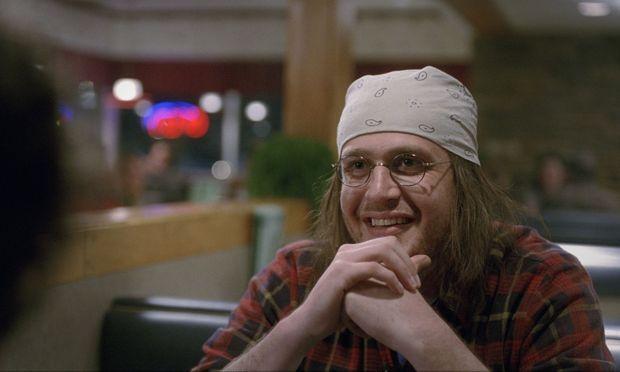Infinite Jester: Jason Segel plays David Foster Wallace
Jason Segel as David Foster Wallace in The End of the Tour (Courtesy of A24)
When word got out a year-and-a-half ago that actor Jason Segel, known for his authentically sweet on-screen persona, was going to play the novelist David Foster Wallace, author of Infinite Jest and one of the great writers of his generation, the instant reaction was, “Whaaat…?”
Could this famously goofy, charming comedy star possibly do justice to the infamously gloomy, antisocial, tragic Wallace? Well, the answer is yes, absolutely, according to PRI’s Kurt Andersen.
The movie, called The End of the Tour, is now in theaters and Segel’s performance is "nuanced, touching and kind of amazing," Andersen says.
On the face of it, one would think Segel and Wallace have little in common. But dig a little deeper and you discover some interesting similarities.
The first thing is their size. Segel is 6-foot-4 and Wallace was a big guy, too. “It’s interesting,” Segel says. “Being big like this really helped with the movie.”
Segel could also relate to what Wallace once called his ‘regular guy-ness.’ Segel says when he reads his favorite parts of David Foster Wallace, he hears a guy who loves movies, just like he does; or who sees the absurdity of a cruise ship vacation.
“I think the important thing, especially when you’re going to play David Foster Wallace, is [to be aware of] a tendency to sort of deify your idols and make them something other than you,” Segel says.
Segel himself has been quoted as saying that his Hollywood circle of friends, which include the director Judd Apatow, is just a group of normal dudes.
“I think that there are many different types of acting,” Segel explains. “One of the types of acting is being the Everyman and sort of offering a surrogate experience to the viewer, saying, ‘For the next hour-and-a-half, I’m you in this extreme scenario.’ I think that’s the type of comedy we do.”
“That’s what I’ve been good at, and, interestingly enough, I think that’s why people respond to David Foster Wallace’s writing,” Segel continues. “He is not talking to you from the end of a journey, saying, ‘Hey, here’s what I figured out.’ He’s talking to you from the thick of it, saying, ‘I’m in the middle of this thing. We’re all the same. I’m in it with you. Here’s how I feel. Anyone else want to join in the conversation?’”
The difference, Segel says, is that Wallace had the emotional and the literal vocabulary to articulate the pain and the confusion that so many of us experience.
One of the other themes of the film, and of Wallace’s writing, is the irresistible tide of stuff — rampant American consumerism. According to Wallace, it is inescapable, but also manageable. Segel agrees.
“Wallace talks about it as ‘dosage,’” Segel says. “And I think that’s kind of the best you can do — to realize, ‘OK, I’m getting a lot of messages to tell me to watch the marathon of this show, but I’m going to try my best to stick to just one.’”
RELATED: David Foster Wallace, my big brother
Wallace also wrote about the illusion that because something feels good, it must be good for you; or because something is easy, it must be right. And in the digital age, the temptation to give into these feelings just keeps becoming more powerful. But Segel, like Wallace, seems to have an understanding of this phenomenon and the willpower to bring it under control.
“I quit the internet — certainly, social media — a while ago. I realized it just didn’t make me feel good,” Segel says. “I mean I use the Internet to order furniture or… you know that itch you get to buy something? But I learned that I’m just as happy with a new HDMI cable as I am with an expensive thing.”
One other interesting factoid about Jason Segel: he brings a picture of the actor Peter Sellers with him whenever he makes a movie.
“When I saw Being There, it changed my thoughts about what was possible for me as an actor,” Segel says. “I saw somebody who I was familiar with from The Pink Panther all of a sudden do something that was so deeply moving and dramatic, and I just thought, ‘Oh, you’re allowed to do anything. It’s up to you.’”
“I’m self-aware enough to know that the David Foster Wallace script doesn’t come across someone’s desk and then somebody says, ‘Get Jason Segel on the phone immediately!’” Segel adds. “But I think things work out just the way they’re supposed to.”
This article is based on an interview that aired on PRI's Studio 360 with Kurt Andersen
